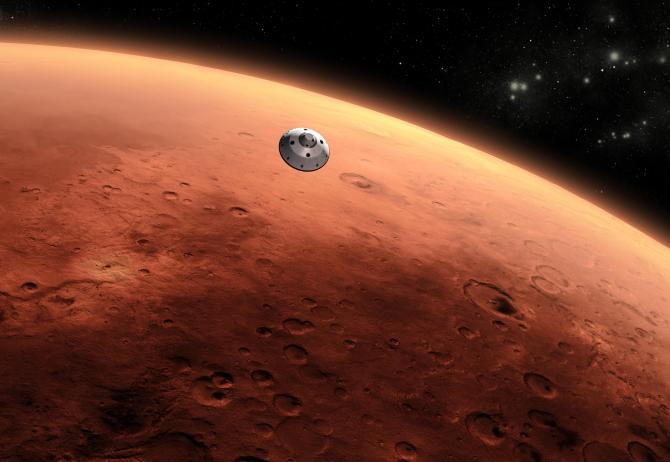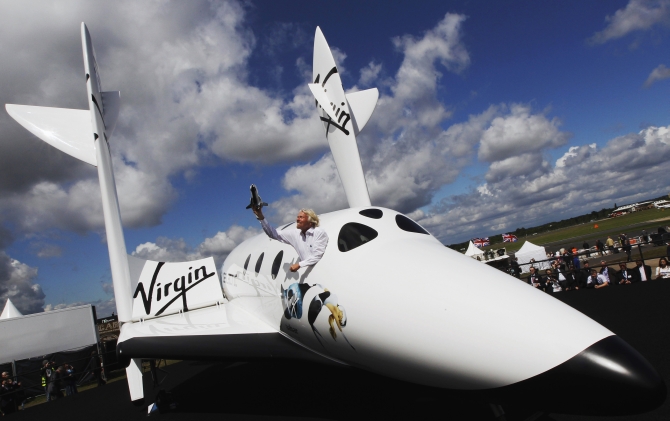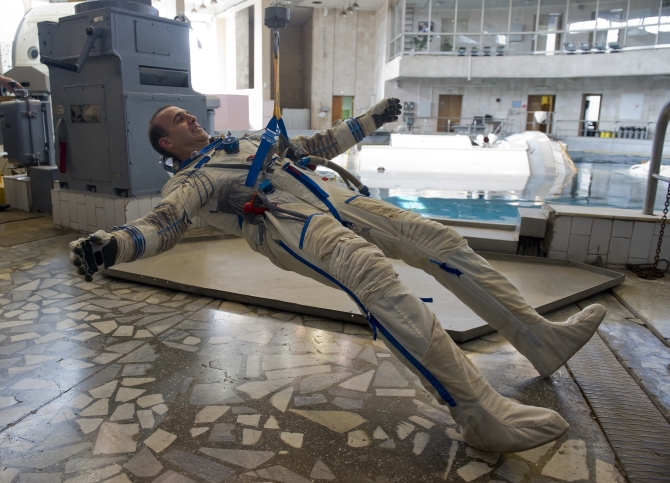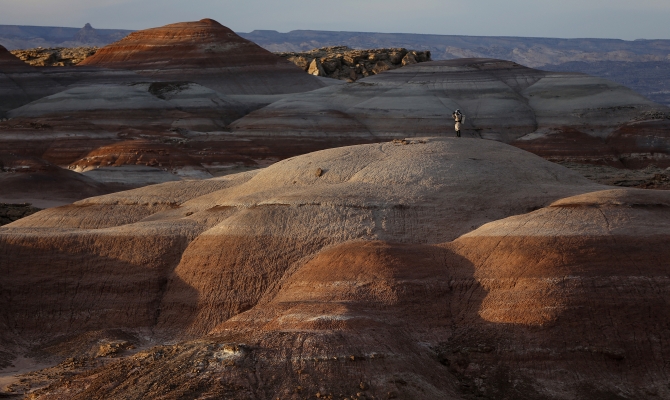Photographs: NASA handout/Reuters Dinesh C Sharma
The plan to set up a human colony on Mars is a crude joke on unsuspecting and ignorant space enthusiasts, says Dinesh C Sharma.
Like the Biblical tale of Jacob’s stairway to heaven, Mars One, a Netherlands-based outfit, is promising people a one-way ticket to Mars. Nearly 20,000 Indians are among the two lakh people who have applied for a seat on the spaceship to the red planet.
The company will select six to 10 teams of four individuals each by 2015. They will undergo seven years to full-time training before one of the teams is finally selected to land on Mars in 2023 and spend rest of their lives there.
Anybody with even basic knowledge of space business or technology would know that this plan of setting up a human colony on Mars is a crude joke on unsuspecting and ignorant space enthusiasts. Official Chinese media has dubbed it a hoax after an investigation, while Western experts are highly sceptical of its scientific, technical and financial feasibility.
Space scientists I have spoken to have called the plan “100 percent unrealistic”. It is impossible for a start-up to plan a mission to the red planet -- even with the use of technologies available -- and execute it within a timeframe of 10 years.
Scientists are yet to master several critical technologies needed for a long journey into deeper space and for extended stays in the hostile atmosphere of other planets. In addition, it is unethical to offer only a one-way passage to astronauts when there are uncertainties about survival of humans on Mars.
…
RED ALERT: The truth behind one-way ticket to Mars
Image: The percussion drill in the turret of tools at the end of the robotic arm of the Mars rover Curiosity is positioned in contact with the rock surfacePhotographs: NASA handout/Reuters Dinesh C Sharma
Scepticism also emanates from the fact that the American space agency, NASA, with half a century of space experience and financial resources it commands, is yet to announce any firm date to send humans to Mars though it has been preparing for it for decades now. All that space agencies have managed to send are unmanned robotic rovers to Mars.
The latest was 2.5 billion dollar Curiosity rover, which touched down in August 2012. India plans to send an orbiter later this year, which will go around Mars and collect data.
NASA’s vision of human exploration of Mars has a number of key landmarks that need to be achieved before humans embark on a journey to Mars.
These steps include human exploration of Near Earth Objects like asteroids, manned missions to deep space beyond the Moon and sustained human presence on the Moon. If this is so, Mars One needs to explain how it plans to bypass all these crucial steps -- which will give necessary scientific and technological inputs for future missions -- and leapfrog to Mars?
…
RED ALERT: The truth behind one-way ticket to Mars
Image: Entrepreneur Richard Branson waves a model of the LauncherOne cargo spacecraft from a window of an actual size model of SpaceShipTwo on display, after Virgin Galactic's LauncherOne announcement and news conference, at the Farnborough Airshow 2012 in southern EnglandPhotographs: Luke MacGregor/Reuters Dinesh C Sharma
Private space exploration is not new. Maverick businessman Richard Branson has launched commercial space business under his company called Virgin Galactic, which plans to promote space tourism. But he is not promising a trip to Moon or Mars like Mars One.
Virgin Galactic will take space tourists to explore space in a limited way -- it will let them experience near-zero gravity experience at the very “gateway” of space at a point where the earth’s gravity ends and space begins. It will do so by taking people onboard its spaceship, which it has developed and has already demonstrated. Five hundred people including an Indian have signed up to get this space experience. The first batch of space tourists is undergoing training.
Compared to Branson’s project, Mars One sounds more of a flyby night operator. From selection to landing on the red planet, it is going to be a media spectacle. Actually this is how Mars One plans to raise six billion dollars it needs to send the spaceship to Mars within a decade’s time. It says it will turn the whole expedition -- selection, training, journey to Mars, life on Mars -- into a television reality show and earn through media rights, branding and on. Merchandise such as mugs and t-shirts are already on sale.
Like Bigg Boss, audiences will be invited to participate in the selection process. It is another question how Mars One will let its Mars explorers communicate with Earth for its reality show when currently it takes about 20 minutes for communication signals to reach from Mars to Earth.
The 2023 mission, the company says, will cost six billion dollars. However, it does not say how many more billions of dollars will be required for sending cargo spaceships to Mars to ferry necessary material to build the colony before humans land there.
…
RED ALERT: The truth behind one-way ticket to Mars
Image: NASA astronaut Rick Mastracchio attends a training exercise at the Star City space centre outside Moscow, August 7. Mastracchio is scheduled to be part of a mission to the International Space Station that will launch in November 2013.Photographs: Sergei Remezov/Reuters Dinesh C Sharma
The only experience humans have of living outside the planet Earth is that of the International Space Station, which is located about 250 kilometres from Earth. It took just six hours for astronauts to reach the ISS in March this year. It had taken four days for Apollo 11 to land on the moon in 1969. In contrast, it will take anything between six and nine months for humans to reach Mars with the most advanced propulsion systems available.
The inter-planetary journey will be grueling because the spacecraft will be exposed to challenges of cosmic radiation and other unforeseen hazards.
The long itself journey will pose tremendous health challenges for Mars One astronauts. They will face a host of yet unknown physiological and psychological problems. If they survive the journey somehow and land on the red planet, they will have to live in a hostile Martian environment without supplies of food, water and oxygen in the so-called colony Mars One is promising.
Even if scientists find on Mars before Mars One lands there, it will be in the molecular form not in the form of flowing rivers or ponds as popular imagination goes. One of the most dynamic weather patterns on Mars is generation of dust storms, which occur in the southern spring and summer. These storms can grow to envelop the whole planet. Scientists are only beginning to understand how these storms develop and grow.
Click NEXT for more photos…
RED ALERT: The truth behind one-way ticket to Mars
Image: Volker Maiwald, executive officer and habitat engineer of Crew 125 EuroMoonMars B mission, walks among the rock formations while collecting geologic samples for study at the Mars Desert Research Station in the Utah desert. The MDRS aims to investigate the feasibility of a human exploration of Mars and uses the Utah desert's Mars-like terrain to simulate working conditions on the red planetPhotographs: Jim Urquhart/Reuters Dinesh C Sharma
Mars also lacks an ozone layer unlike Earth where such a layer shields us from lethal doses of ultraviolet radiation.
Scientists still have no good information about the amount of ultraviolet radiation that reaches the Martian surface. Unless Mars One has this information, we don’t know how is it going to design protective space suits and habitats. Similarly, the impact of “superoxides” in Martian soil needs to be assessed before humans can land there.
No wonder, the company is giving only one-way ticket to Mars. Perhaps it knows there will be nobody left for the return journey.
The writer is a science journalist and author based in New Delhi






article